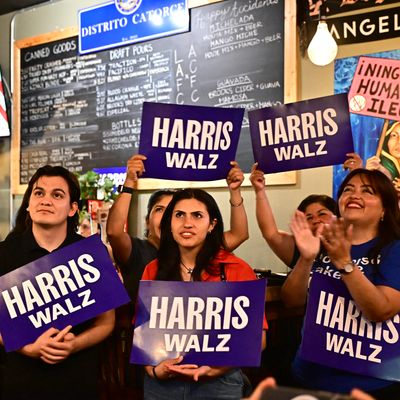
The revival of Democratic presidential fortunes after Kamala Harris replaced Joe Biden as the nominee is mostly explained by the return of Democratic-leaning voter groups that had defected either to Donald Trump, to a non-major-party candidate, or to a disinclination to vote at all. This has included significantly better polling numbers among Latinos (a.k.a. Hispanics), a rapidly growing segment of the electorate with which Trump made surprising gains in 2020 (from 28 percent in 2016 to 38 percent in 2020) despite his xenophobic views. Among other things, this improvement has helped make Harris competitive in Sun Belt states with sizable Latino populations.
How has Harris turned things around? As Equis Research’s Carlos Odio told my colleague Benjamin Hart in a recent interview, it mostly reflects a more general trend among younger and less partisan voters who intensely disliked the choice of Biden and Trump:
When you look at who Kamala Harris picked up almost immediately, it was Democratic-leaning Latinos. Almost 60 percent of them had voted for Biden in 2020, and the rest had not voted in 2020. It was a younger voter: 60 percent of those she picked up were under the age of 40. And so you’re talking about voters who simply were not happy with the choices in front of them. A third of them were double haters — they disliked both Biden and Trump. They didn’t like the choices in front of them. It felt like a Sophie’s choice.
So to a considerable extent, Harris’s ability to hold on to and possibly expand her margin among Latino voters depends on her more general success or failure in presenting herself as a candidate of change — safer change, that is, than is represented by Trump. But there are specific challenges she faces as well. Odio suggests her campaign is finally beginning to abandon a one-size-fits-all message to Latinos that treats them as monolithic and focuses excessively on maintaining a liberal immigration policy. And indeed, as Politico reports, Harris’s Latino messaging is more about the economy, crime, and even tough talk about the border:
Harris is attempting to chart a path away from identity politics, including in the way she’s courting Latino voters in states like Arizona, Nevada and Pennsylvania.
In those battlegrounds, Harris campaign ads targeted at both English- and Spanish-speaking Latinos talk about the economy, high drug prices and crime. Harris, in a Spanish-language radio interview that aired earlier this week, stressed her support for stationing more immigration agents at the border and cracking down on the flow of fentanyl into the U.S.
She’s also avoiding the temptation to appeal to Latino voters on the basis that she, like them, is a person of color. Aside from the fact that around 10 million U.S. Latinos self-identify as white, many others (including multiracial Latinos) feel no particular solidarity with non-white groups.
While Harris’s Latino messaging seems to be reasonably effective, there are some Latino activists who are vocally annoyed at her (and Biden’s) pivot away from sympathy toward migrants and adoption of more restrictive border policies. And at the same time, her apparent decision to limit her discussion of immigration policy to neutralizing some of Trump’s ancient border-security obsession (with an occasional shout out to the most popular group of undocumented Americans, the DREAMers brought into the country as children) may be leaving some potential attack lines off the table.
Harris did, during a recent speech at the Congressional Hispanic Caucus Institute, briefly mention Trump’s pledge to “CARRY OUT THE LARGEST DEPORTATION OPERATION IN AMERICAN HISTORY,” as the 2024 GOP platform puts it. She offered a couple of questions:
We all remember what they did to tear apart families. And now they have pledged to carry out the largest deportation — a mass deportation — in American history.
Imagine what that would look like and what that would be. How is that going to happen? Massive raids? Massive detention camps? What are they talking about?
But then she moved on to other topics.
The opportunity she and her campaign have is to raise much broader questions about the potential impact of a mass-deportation project on legal Latino citizens. Will this be like the infamous 2010 “show your papers” law in Arizona that authorized random police questioning of people who might be undocumented immigrants? That law was partially struck down by the U.S. Supreme Court because it violated the federal government’s monopoly over immigration policy. If something like a regime of racial and ethnic profiling is imposed nationally, under the whip of Trump’s longtime immigration adviser Stephen Miller, even Latinos who favor tough border and immigration policies might have reason to be concerned. Yes, polls show a spare majority of Americans say they favor mass deportations, but probably few have focused on the real-life implications, as the Harris campaign might encourage them to do.
Harris and her campaign are indeed on a tightrope with such issues. So far her inclination seems to be to give immigration-related topics as wide a berth as possible and focus her campaign on abortion rights, health care, and Trump’s dangerous character. But the prospect of Trump using his final term to build barbed-wire-surrounded transit camps and a massive transportation system to send law-abiding immigrants to the border, augmented by police-state tactics to round up “suspects,” is a vision worth sharing with Latinos and all Americans.
More on politics
- Trump Ambassador Picks: Who’s in His ‘Diplomatic Clown Car’
- What We Learned From the House Ethics Report on Matt Gaetz
- Everyone Biden Has Granted Presidential Pardons and Commutations






























